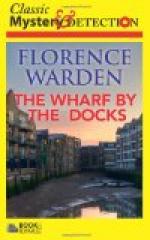Now, although he had drunk more wine than usual, Dudley knew perfectly well what he was saying, and Max stared at him in astonishment.
“What?” he exclaimed. “After what you told me? About my father?”
“Oh, yes, yes. But I can explain everything. I can, and I will,” returned Dudley, quickly. “I have not been myself lately. I have had certain business worries. But they are all settled now, and I feel more like myself than I have done for weeks.”
Max stopped short and stared at his friend by the light of a gas-lamp.
“Well, you don’t look it,” said he, shortly.
Dudley laughed loudly, but rather uneasily.
“Don’t you think I could give an explanation which would satisfy your father, if I wished?” he asked, with a sudden relapse into gravity.
“I’m hanged if I know,” retorted Max, energetically. “You haven’t given any explanation which would satisfy me.”
Dudley stared into his face for a few seconds inquiringly, and then quietly hooked his arm and led him along the Strand.
“You don’t want to be satisfied, old chap,” said he, in a low voice. “You know me.”
Again Max was deeply touched. This was a sudden and unexpected peep under the surface of deception into the real heart of his old chum. He replied only by a slight twitching of the arm Dudley had taken.
They walked on at a quicker pace, and ran up the stairs to the door of Dudley’s rooms in silence.
Dudley went first into the sitting-room and turned up the gas. It did not escape Max that he shot a hurried glance around the room, taking in every corner, as he entered. Talking all the time about the cold and the fog, Dudley went into the adjoining room, and Max saw him pull aside the bed-curtains and look behind them.
Then Max, not wishing to play the spy on his friend, turned his back; and as he did so he caught sight of the railway ticket which had fallen to the floor from Dudley’s pocket before they went out.
Max picked it up, and noted that it was the return half of a first-class return ticket from Fenchurch Street to Limehouse, and that it was dated that very day.
He had scarcely noted this, mechanically rather than with any set purpose, when he was startled to find Dudley at his elbow.
Max turned round quickly, but Dudley’s eyes were fixed upon the railway ticket.
“You dropped this when you—” began Max, handing it to his friend.
It was not until then, when Dudley took the ticket from him and tossed it into the fireplace with a careless nod, that it flashed into the mind of Max that the incident had some significance.
What on earth had Dudley been doing at Limehouse? His parents had had property there, certainly, many years ago. But not a square foot of the grimy, slimy, auriferous Thames-side land, not a brick or a beam of the warehouses and sheds which had been theirs in the old days, had descended to Dudley. Owing to the fraudulent action of Edward Jacobs, all had had to go.




